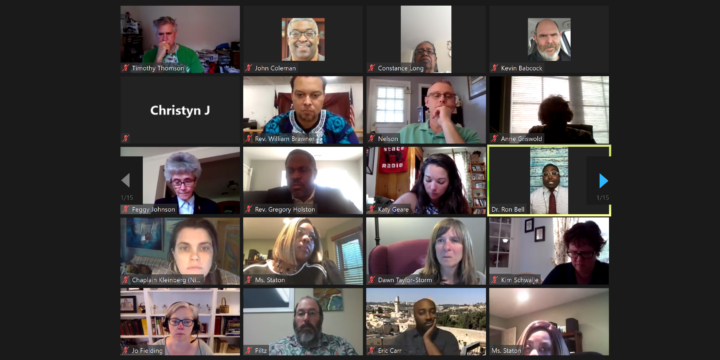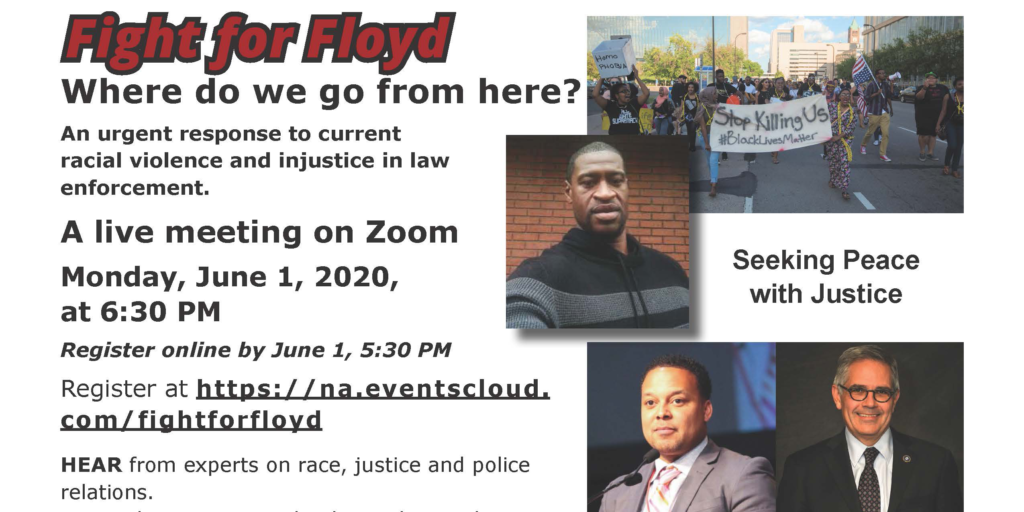
By John Coleman
Nearly 300 participants joined an Eastern PA Conference video-conference on Zoom June 1 seeking ways to “Fight for Floyd,” following the brutal, racist killing of George Floyd by Minneapolis police just a week earlier on May 25.
His tragic, senseless slaughter—viewed by millions on television and evoking countless other murders of unarmed black people in America—was a defining moment for our nation. It immediately launched scores of large protest marches for justice, plus incendiary civil unrest, tense racial dialogues and some initial changes in law enforcement policies…but nowhere near enough.

Sponsored by the Conference’s Urban Commission, the large online gathering posed a challenging question to which many still seek an answer: “Where do we go from here?” The two-hour dialogue, with diverse participants from across the conference and beyond, included guest speakers– criminal justice officials, community leaders and pastors—who voiced grave concerns but no sure remedies.
Seeking remedies is the work of three committees that emerged from that dialogue and that meet monthly to share information and experiences and try to plan and implement responsive actions. The groups, which number more than a dozen members each and include many non-United Methodists, seek to address the present crisis of racial injustice from three directions: Community Development; Education; and Public Policy.
The Rev. William Brawner, the Conference’s part-time Urban Ministries Coordinator and pastor of Zoar’s New Vision UMC in Philadelphia, promptly organized the dialogue. Now he and a leadership team try to oversee and resource the committees’ diverse efforts.
Brawner and the Urban Commission will convene the groups and others who want to be involved in the Fight for Floyd in a video-conference meeting on Zoom Thursday, Oct. 29, at 6:30 to 8 PM. Registration and access information is forthcoming.
The Community Development Committee is co-chaired by the Rev. David Eckert, who also co-chairs the Urban Commission, along with Charise Staton. It focuses on seeking and creating interactive opportunities to bridge the divide and foster healthy relationships between police, policymakers and community residents, especially in communities of color.
The Education Committee is co-chaired by the Rev. David Piltz, a pastor and Conference Coordinator of Young People’s Ministries, and Gail Loney, a longtime community leader and activist. This committee focuses on seeking and creating opportunities to educate people—especially White people—about the historic and current prevalence of systemic racism and injustice.
In addition, the committee wants to promote hopeful examples of candid discourse and healthy, just, redemptive relationships in communities. Members want to include schools and other centers of influence in its educational outreach efforts.
The Policy Committee is led by the Rev. Susan Worrell, co-chair of the Conference’s Commission on Religion and Race. It engages in informed advocacy to call for justice and equity in government and law enforcement policies and practices, especially those that unfairly victimize People of Color and other groups.
“These committees are not just meeting for conversation, although we are learning from one another,” said Brawner. “This work is very important, and we need more people committed and engaged in it to find our way forward in the search for racial justice.”
